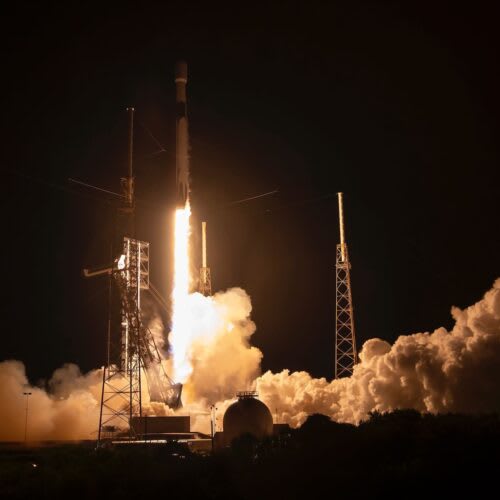Amazon's Cosmic Ambitions: Riding the Satellite Wave
 The Tech Times
The Tech Times
Amazon has once again made significant strides in its ambitious Project Kuiper, launching 78 of its planned 3,232 broadband satellites. This latest endeavor, facilitated by a SpaceX launch, marks another chapter in the tech giant's quest to provide global internet coverage from space. As the race to populate the low Earth orbit (LEO) with satellites intensifies, Amazon's foray into the satellite industry not only highlights its futuristic aspirations but also underscores the evolving dynamics of space-based internet services.
A Brief History of Satellite Internet
The concept of satellite internet isn't new. It dates back to the early days of space exploration, when the idea of beaming data from space to Earth sparked imaginations. However, it wasn't until the late 1990s and early 2000s that technology began catching up with these lofty ambitions. Companies like Iridium and Globalstar attempted to create global satellite phone networks, but their high costs and technical challenges limited widespread adoption.
Fast forward to the 2010s, and the satellite industry began to experience a renaissance, largely driven by the decreasing costs of launching and manufacturing satellites. This was further fueled by visionary entrepreneurs like Elon Musk, whose SpaceX made launching satellites more affordable and accessible. Amazon's Kuiper project, announced in 2019, is part of this new wave of satellite initiatives aiming to bridge the digital divide and provide high-speed internet access to underserved regions.
The Strategic Importance of Project Kuiper
Amazon's Project Kuiper is a strategic play in the burgeoning satellite internet market. By launching a constellation of LEO satellites, Amazon aims to deliver fast and reliable internet services across the globe, competing directly with SpaceX's Starlink and other emerging satellite networks. This move not only promises to generate significant revenue but also aligns with Amazon's broader mission of global connectivity and market expansion.
The integration of satellite internet with Amazon's existing services—such as its e-commerce platform, cloud computing through Amazon Web Services (AWS), and Alexa-enabled devices—could create a seamless digital ecosystem, enhancing user experience and driving customer loyalty. Additionally, Project Kuiper could provide Amazon with valuable data on user behavior and preferences, further strengthening its position in the tech industry.
Challenges and Considerations
Despite the potential benefits, the satellite internet race is fraught with challenges. Regulatory hurdles, such as obtaining international approvals and coordinating with national governments, are significant obstacles. Moreover, the sheer number of satellites being launched raises concerns about space debris and the long-term sustainability of LEO operations.
Furthermore, competition in the satellite internet space is fierce, with SpaceX's Starlink already boasting a considerable head start. As of 2023, Starlink has launched thousands of satellites, offering beta services to users worldwide. To catch up, Amazon must not only accelerate its launch schedule but also ensure its technology is competitive in terms of speed, latency, and pricing.
Looking Ahead
As Amazon continues its journey on the "rocket merry-go-round," the future of satellite internet looks promising yet complex. Project Kuiper represents a bold step into uncharted territory for Amazon, one that could redefine the landscape of global connectivity. By leveraging its technological prowess and vast resources, Amazon is well-positioned to become a key player in the next frontier of the internet.
Ultimately, the success of Project Kuiper will depend on Amazon's ability to navigate the technical, regulatory, and competitive challenges that lie ahead. Should it succeed, the implications for global internet access and Amazon's business model could be profound, ushering in a new era of digital inclusivity and innovation.
Source: Amazon’s ride on the rocket merry-go-round continues with SpaceX launch
Subscribe to my newsletter
Read articles from The Tech Times directly inside your inbox. Subscribe to the newsletter, and don't miss out.
Written by
